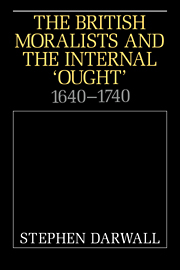Book contents
- Frontmatter
- Contents
- Acknowledgments
- List of abbreviations
- The British moralists and the internal ‘ought’: 1640–1740
- 1 The British moralists: inventing internalism
- 2 Culverwell and Locke: classical and modern natural law
- 3 Hobbes: ethics as “consequences from the passions of men”
- 4 Cumberland: obligation naturalized
- 5 Cudworth: obligation and self-determining moral agency
- 6 Locke: autonomy and obligation in the revised Essay
- 7 Shaftesbury: authority and authorship
- 8 Hutcheson: moral sentiment and calm desire
- 9 Butler: conscience as self-authorizing
- 10 Hume: norms and the obligation to be just
- 11 Concluding reflections
- Works cited
- Index
5 - Cudworth: obligation and self-determining moral agency
Published online by Cambridge University Press: 02 December 2009
- Frontmatter
- Contents
- Acknowledgments
- List of abbreviations
- The British moralists and the internal ‘ought’: 1640–1740
- 1 The British moralists: inventing internalism
- 2 Culverwell and Locke: classical and modern natural law
- 3 Hobbes: ethics as “consequences from the passions of men”
- 4 Cumberland: obligation naturalized
- 5 Cudworth: obligation and self-determining moral agency
- 6 Locke: autonomy and obligation in the revised Essay
- 7 Shaftesbury: authority and authorship
- 8 Hutcheson: moral sentiment and calm desire
- 9 Butler: conscience as self-authorizing
- 10 Hume: norms and the obligation to be just
- 11 Concluding reflections
- Works cited
- Index
Summary
For Hobbes and Cumberland, the rationale for the internal turn was philosophical naturalism. If ethics is simply the study of “consequences from the passions of men,” and if “the Whole of moral Philosophy” is to be “resolv'd into … conclusions of true Natural Philosophy” then there may seem nothing plausible for morality's normative grip to be other than its motive power, viewed from the perspective of a rational human agent. From an agent's point of view, empirical truths to which an observer is indifferent can present themselves as demands – as matters of practical, rather than merely natural, necessity. To the agent for whom self-preservation is an inescapable end, for example, facts about the natural necessities of survival have an unavoidable practical force; they present themselves as what ought to or must be done.
Empirical naturalist internalism of this sort exercised a continuing attraction throughout the early modern period, as it has, indeed, to the present day. At the same time, a second, quite different, internalist line of thought developed alongside it: an autonomist internalism or internalism of practical reason. We encountered elements of this line, in early form, in Culverwell's notion that only a being capable of “moral government” can be subject to obligation. We shall return to it again in Locke's Essay thesis that moral government must involve self-government. Neither Culverwell nor Locke (at least in his earlier writings) proposed, however, that obligation itself be understood to consist in the motives of a self-determining agent, and so neither was an autonomist internalist.
Information
- Type
- Chapter
- Information
- The British Moralists and the Internal 'Ought'1640–1740, pp. 109 - 148Publisher: Cambridge University PressPrint publication year: 1995
